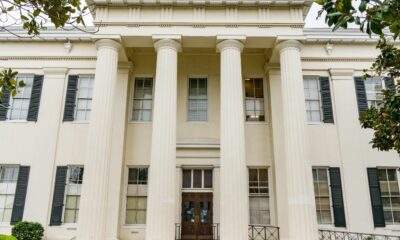Mississippi Today
Company deemed ‘future of education’ for rural schools to falter without cash infusion, founder says
An education company that helps bring free college-level science courses to poor, rural public schools, many in the Mississippi Delta, will lose federal funding after the Biden Administration did not renew its grant last year.
The Global Teaching Project has received more than $3.5 million from the U.S. Department of Education to support its work offering Advanced Placement science courses to nearly 40 high-poverty schools.
Over 1,000 have enrolled in the project's classes, according to its founder, former tax attorney Matt Dolan, who says he has put more than six figures into the project since starting it in 2017. Districts could offer AP courses that they never had before.
Global Teaching Project's “blended” instructional model — online course content taught by in-class teachers who are supported by virtual STEM tutors from universities such as Harvard — was even praised by school choice and school voucher proponent Betsy DeVos, the Trump administration's education secretary. Experts have heralded this approach as “the future of education, especially for rural schools,” and the Global Teaching Project has drawn the attention of entrepreneurs like Mark Cuban.
It's also a model that has the interest of powerful Mississippi Republicans. Senate Appropriations Chair Briggs Hopson told the Magnolia Tribune earlier this legislative session that he hopes to expand virtual learning for schools that struggle to find qualified teachers.

But the Global Teaching Project's growth could falter without more financial support when its federal Education Innovation and Research grant expires this summer as, Dolan said, a majority of that funding went to the program costs. The minimum needed to operate this coming year is $1.2 million, Dolan said.
The Mississippi Public School Consortium for Educational Access, a coalition of rural public school districts, was technically the recipient of federal funds, but Dolan said the Global Teaching Project was the driver of the initiative, a relationship that grant reviewers in 2019 said could be clarified.
“My guess is they've never seen such a thing where somebody not only develops and implements the program, but they provide the money,” Dolan said. “That's what we told the school districts when we first started in 2017. We said we want to do this, and we're not asking you to give us a penny.”
Last year, the Biden Administration awarded more than $275 million in funding to projects in 20 states. Projects in three states — California, Massachusetts and Texas — received almost as much funding as the remaining 17.
Without the project, the Quitman County School District would not be able to offer AP Computer Science, said Baxter Swearengen, a special-education teacher who acts as a “facilitator” for the courses.
Neither would the Holmes County School District, said Iftikhar Azeem, the science department chair at Holmes County Central High School. He teaches AP Physics and AP Computer Science.
That's because these districts, which have a small tax base, can't compete with other counties and even states that pay teachers much better, or with other science-professions.
“The very fundamental thing is funding,” Azeem said. “I've taught several hundred physics students, but nobody came back as a teacher because when they do get a masters in science, they get a better job. … Why should they work as a teacher?”
Both districts struggle to retain college-educated graduates amid population losses since 2010.
“A place like Holmes County, Mississippi, has fewer residents today than it did when the Civil War broke out,” Dolan said. “That teachers are not moving there is symptomatic of broader issues about exodus from these communities.”
The Global Teaching Project helps fill this gap, Dolan said, by providing schools with “turnkey courses,” as well as textbooks and workbooks that students don't have to pay for. And teachers like Swearengen and Azeem are offered stipends for professional development courses.
“We are paying our teachers, not the other way around,” Dolan said. “We are providing services to our students. They never pay us a penny. Their parents never pay us a penny. We've never used a dollar of state or local tax dollars.”
More than 90% of students who take Global Teaching Project's classes go to college, though Dolan couldn't provide the exact number, he said, due to limitations collecting data from public schools. But when students get to college, they are prepared, he said.
“Where we make a difference, and here I am confident, is where they go to college, how well they do in college, how prepared they are in college, their persistence and scholarships,” Dolan said.
Dolan said he has partial data on pass-rates on the AP national exams for Global Teaching Project students and that the pass-rate for AP Computer Science tends to be higher than AP Physics. A majority of students do not earn a qualifying score for college credit on the exams, which is a three or higher, Dolan said.
“By taking this exam, you are part of an elite group,” Dolan tells his students.
Both teachers said their classes' exam scores aren't as high as they wish due to a myriad of factors.
In Quitman County, students don't struggle with the curriculum, Swearengen said, because the Global Teaching Project provides tutors from Ivy League schools. It's more about attention: Swearengen said his students tend to miss class for major athletic events. Cellphones are another distraction.
But the biggest struggle, Swearengen said, is technology. His district has limited bandwidth. During end-of-year testing, only so many students can use a computer at one time, he said. Sometimes, all nine of his students have to crowd around one computer.
That's a huge reason his AP Computer Science pass-rate isn't where Swearengen wants it to be.
“We have so many students on computers to where the technology person will just shut the entire network off,” he said.

Still, Swearengen said the Global Teaching Project has benefited his students in ways that can't be quantified. Through the project, they have an opportunity to experience college-level curriculum and visit campuses like Jackson State University.
Their self-regard increases, he said.
“They get to spend a night in a hotel room when they've never been,” he said. “They get to go to conferences and eat different food. And talk about computers. It's just so much. It's a bigger picture than I think anybody could have imagined.”
That was Demeria Moore's experience when, as a junior and senior at McAdams Attendance Center in Attala County, she took AP Physics and AP Computer Science, the latter course she was able to claim college credit for at Holmes Community College.
Though it was lonely to be the only student in the AP Computer Science course, Moore said participating in the class helped her understand the “why” behind the world.
“When I look out the window and I see the leaves, how they're full of chlorophyll and the sun will allow them to have energy, and how that energy can get transferred to me and that just creates the circle of life,” Moore said. “All those little things have some type of science or math attached to it. It all just blew my mind.”
Moore said the Global Teaching Project also provided a sense of community at her school where teacher turnover is high. McAdams is a junior-senior high school and, by the time she graduated, all her teachers from seventh grade had left.
“I had some really good teachers and even the students who may have just maybe caused a few issues in class, even they would listen to these teachers. And I just wish they would have stayed so everybody could have a better learning experience,” she said.
Dolan said one of the successes of the Global Teaching Project also comes with irony. His initiative can help teachers become AP certified, which can lead them away from high-poverty school districts to ones that can pay better.
“We recognize there are certain issues that we cannot affect,” Dolan said. “We don't determine who is in the building, but we will serve whoever is there.”
This article first appeared on Mississippi Today and is republished here under a Creative Commons license.
Mississippi Today
On this day in 1896


MAY 18, 1896

The U.S. Supreme Court ruled 7-1 in Plessy v. Ferguson that racial segregation on railroads or similar public places was constitutional, forging the “separate but equal” doctrine that remained in place until 1954.
In his dissent that would foreshadow the ruling six decades later in Brown v. Board of Education, Justice John Marshall Harlan wrote that “separate but equal” rail cars were aimed at discriminating against Black Americans.
“In the view of the Constitution, in the eye of the law, there is in this country no superior, dominant, ruling class of citizens,” he wrote. “Our Constitution in color-blind and neither knows nor tolerates classes among citizens. In respect of civil rights, all citizens are equal before the law. The humblest is the peer of the most powerful. The law … takes no account of his surroundings or of his color when his civil rights as guaranteed by the supreme law of the land are involved.”
This article first appeared on Mississippi Today and is republished here under a Creative Commons license.
Did you miss our previous article…
https://www.biloxinewsevents.com/?p=359301
Mississippi Today
Renada Stovall, chemist and entrepreneur
Renada Stovall sat on the back deck of her rural Arkansas home one evening, contemplating life when she had a life-altering epiphany…
“I gotta get out of these woods.”
She heard it as clear as lips to her ear and as deep as the trees surrounding her property. Stovall's job as a chemist had taken her all over the country. In addition to Arkansas, there were stints in Atlanta, Dallas and Reno. But she was missing home, her parents and friends. She also knew, she needed something else to do.
“I thought, what kind of business can I start for myself,” said Stovall, as she watered herbs growing in a garden behind her south Jackson home. Some of those herbs are used in her all-natural products. “I know when I lived in Reno, Nevada, where it's very hot and very dry, there really weren't products available that worked for me, my hair, and my skin suffered. I've got a chemistry degree from Spelman College. I took the plunge and decided to create products for myself.”

In 2018, Stovall's venture led to the creation of shea butter moisturizers and natural soaps. But she didn't stop there, and in December 2022, she moved home to Mississippi and got to work, expanding her product line to include body balms and butters, and shampoos infused with avocado and palm, mango butter, coconut and olive oils.
Nadabutter, which incorporates Renada's name, came to fruition.

Stovall sells her balms and moisturizers at what she calls, “pop-up markets,” across the state during the summer. She's available via social media and also creates products depending on what of her ingredients a customer chooses. “My turmeric and honey is really popular,” Stovall added.
“The all-natural ingredients I use are great for conditioning the skin and hair. All of my products make you feel soft and luscious. The shea butter I use comes from West Africa. It's my way of networking and supporting other women. And it's my wish that other women can be inspired to be self-sufficient in starting their own businesses.”





This article first appeared on Mississippi Today and is republished here under a Creative Commons license.
Mississippi Today
On this day in 1954
MAY 17, 1954

In Brown v. Board of Education and Bolling v. Sharpe, the U.S. Supreme Court unanimously ruled that the “separate but equal” doctrine in Plessy v. Ferguson was unconstitutional under the 14th Amendment, which guaranteed equal treatment under the law.
The historic decision brought an end to federal tolerance of racial segregation, ruling in the case of student Linda Brown, who was denied admission to her local elementary school in Topeka, Kansas, because of the color of her skin.
In Mississippi, segregationist leaders called the day “Black Monday” and took up the charge of the just-created white Citizens' Council to preserve racial segregation at all costs.
This article first appeared on Mississippi Today and is republished here under a Creative Commons license.
-
SuperTalk FM5 days ago
Martin Lawrence making 3 stops in Mississippi on comedy tour
-
Our Mississippi Home4 days ago
Beat the Heat with Mississippi’s Best Waterparks
-
SuperTalk FM1 day ago
State auditor cracking down on Mississippians receiving unemployment benefits
-
Our Mississippi Home5 days ago
Charlie’s U-Pik: Opening Soon for the Summer Season
-
Mississippi News Video3 days ago
Jackson has a gang problem
-
Kaiser Health News4 days ago
Medicaid ‘Unwinding’ Decried as Biased Against Disabled People
-
228Sports4 days ago
George County Pours Runs In 6A South State Title Victory At PRC
-
Mississippi Today2 days ago
On this day in 1950









































